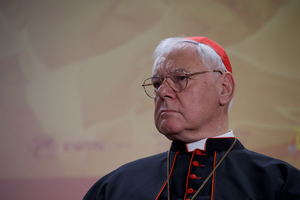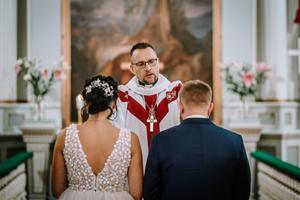How Islamic Are Islamic Terrorists?
According to experts, the fundamentalist jihadists who carry out murderous attacks are Muslims whose beliefs are rooted partly in longstanding Islamic teachings.

ROME — President Barack Obama refrained from describing Nov. 13’s Paris attacks as “Islamic terrorism” or even radical Islamic terrorism, continuing his policy of distancing such atrocities from the religion.
But that nonetheless leaves open the question: How Islamic are Islamic terrorists?
To equate the attacks with “views of Islam” creates “stereotypes” that are “counterproductive” and “wrong,” Obama told reporters at the G20 Summit in Antalya, Turkey, Nov. 16. “They will lead, I think, to greater recruitment into terrorist organizations over time, if this becomes somehow defined as a Muslim problem as opposed to a terrorist problem.”
The Nov. 13 coordinated terrorist attacks of mass shootings, suicide bombings and hostage-taking were the deadliest in France since World War II, costing 129 lives and leaving at least 80 critically injured. The Islamic State group (ISIS), a fundamentalist jihadist group that emerged from the Sunni vs. Shiite conflicts in Iraq and Syria, claimed responsibility for the atrocity. Following the attacks, eight of the attackers were dead — seven of them from suicide explosions and one killed by security forces in the music venue.
President Obama, like President George W. Bush before him, has long been reluctant to tie a “true Islam” to such attacks. Many Muslims also try to distance themselves from any linkage of their religion to violence, asserting that such claims are false and expose “moderate Muslims” to potential reprisals or victimization.
Daisy Khan, director of the Women’s Islamic Initiative for Spirituality and Equality, a nonprofit group that seeks equality and justice for Muslims, told CNN on Nov. 17 that there is “nothing Islamic in anything they [ISIS] say.” They are “psychopaths,” she said, adding that they have caused “huge problems” for the Muslim community. Politicians, she added, have to “stop portraying the Muslim community as a national security threat,” as this just “feeds into the hands of ISIS.”
Not a Consensus View
But this is by no means the consensus. Although it can be persuasively argued that ISIS is an aberration of Islam and only followed by a minority, “it is Islamic,” said Jesuit Father Samir Khalil Samir, a scholar of Islam and pro-rector of the Pontifical Oriental Institute in Rome. ISIS’ first aim, he stressed, is to re-create the caliphate of Baghdad — that is, make it into a single, theocratic, one-world government, as proposed by many devout Muslims.
“Muslims who say this has nothing to do with Islam are simply trying to liberate their consciences to say they disagree with them,” he told the Register. “That they disagree is fine, but to say ISIS are not representing Islam is wrong. They are not representing the whole Islam; no one represents the whole Islam. The same could be said for Christians. But what is for sure is that they do have a fundament in the Islamic tradition, sometimes clearly taking instructions from the Quran, such as when they kill a nonbeliever.”
What ISIS is doing can, therefore, be “found in the original Muslim tradition,” Father Samir added. Although elements of the Old Testament are “unacceptable” to Catholics today, if interpreted literally, for Muslims, “the Quran, or everything which Muhammad did, is divine.” And whereas Catholicism and other religions reinterpret texts for today and read them in context, that is not the case with Islam.
A lack of central authority is a main weakness that “adds to the difficulties,” said Missionaries of Africa Father Paul Hannon, a professor of Islam at the Pontifical Institute for Arab and Islamic Studies in Rome. Whereas the Church has an “updating mechanism” to allow it to deal with “discoveries and challenges to humanity as they occur,” Muslims “don’t have that,” he said.
Rejecting Irreligious Europe
An increasingly irreligious Europe is compounding the problem. When the continent was still predominantly Christian, modernity was seen as a “plus” to many Muslims, said Father Samir.
But today, fundamentalist Muslims see Europe’s contemporary attitudes and actions as “the cause of an unbelieving, secular tradition,” so they reject modernity entirely, and say: “We will go back to the time of the Prophet.” Such a mentality, called Salafism, comes from the Arabic salaf, he said, which refers to the companions of Muhammad, or the first generation that followed him.
This is the solution for most Muslim intellectuals today, Father Samir explained. They want to reproduce “exactly what was done by the Prophet, as they call him.” Both Father Samir and Father Hannon see Islamist violence as a form of Wahhabism (an 18th-century fundamentalist form of Sunni Islam) that harks back to the times of the Prophet. Such extremist elements “are aberrations, both for Islam and for the world,” said Father Hannon, yet to say such attacks have nothing to do with Islam is “disingenuous.”
He further believes that failure to tackle these Islamic elements will make it much harder to eliminate the ISIS threat. The perpetrators, he said, have been “brought up as Muslims in traditional Muslim societies, whether in France or Belgium, or Iraq or Syria.” Changing attitudes, therefore, has to be done “through the mosques,” through Muslim leaders speaking out more boldly and through tackling material and social deprivation to bring young Muslims along the “middle way.”
For anthropology professor Scott Atran, who has interviewed many captured Islamist fighters across the world, as well as potential fighters in rundown French suburbs, treating the Islamic State as a form of terrorism or violent extremism “masks the menace.” And dismissing the group as “nihilistic” reflects a “dangerous avoidance of trying to comprehend, and deal with, its profoundly alluring mission to change and save the world.”
Atran, director of research in anthropology at the National Center for Scientific Research in Paris, is fully supportive of efforts to convince potential ISIS fighters that it is not authentic Islam, if that is possible, but stressed that unless a more compelling and positive counter-message can speak to their “hopes and dreams, fears and grievances,” then any claims about a lack of “authenticity” are “worthless.”
Efforts to instill moderation have to be able to counter the lure of “idealism, rebelliousness and adventure that ISIS appeals to,” Atran told the Register. “If we don’t recognize and deal with the passions, we risk fanning them more.”
“ISIS is a thrilling cause and call to action that promises glory and esteem in the eyes of friends, and through friends, eternal respect and remembrance in the wider world that many of them will never live to enjoy,” he wrote Nov. 16 in the New York Review of Books. The desire of these young people in France is not to be a devout Muslim, he added, “but to become a mujahid (‘holy warrior’): to take the radical step, immediately satisfying and life-changing, to obtain meaning through self-sacrifice.”
Other Contributory Factors
Others see the roots of ISIS not just in Islam and these other factors, but also in the Enlightenment and the French Revolution. Diogo Machado, editor in chief of Fundamentum, a leading Catholic theological journal for young traditional Catholics in Portugal, believes Islamism takes on Enlightenment characteristics by seeking to make imminent “here and now what can be accomplished in the afterlife” and achieving this through “grotesque violence” (Machado says Benedict XVI made a similar point about the jihadist movement in his 1994 book A Turning Point for Europe?).
But this violence, Machado added, is also rooted in a “tradition of conquest and subjugation” that cannot be separated from the “historical experience of Islam.” For this reason, he believes a responsible foreign policy aimed at combating ISIS “must free itself from the prison of Enlightenment thinking.” It must also be able to think on the “historically grand scale of the history of religions, and especially the historic confrontation between Europe and Islam in the Middle Ages.”
Similarly, Church historian Roberto de Mattei sees the terrorism of ISIS as a child of the French Revolution, another fruit of the Enlightenment, as well as of the anarchist, socialist and communist revolutionaries, who “practiced violence en masse and perpetrated the first genocides in the history of mankind” in the 19th and 20th centuries.
Islamic militants, De Mattei wrote in his newsletter Corrispondenza Romana Nov. 18, have “grafted” the European experience of terrorism onto the trunk of Islam’s “intrinsically totalitarian ideology” — a political religion “which has always imposed itself with violence.”
Christian Dialogue
But as always, the solution is broadly seen to rest with the Gospel. Christians have a “beautiful but heavy responsibility” to help Muslims “overcome this reality,” Father Samir said, and this should be done by building friendships with Muslims and proclaiming the Gospel. Machado agrees, arguing that Islam is incapable of reform without “dialogue with Christianity.”
And even though the Pontifical Institute for Arab and Islamic Studies has never hosted a Wahhabi sheikh from Saudi Arabia, and nor do institute members expect one will visit, it is still important to “reach out to them,” said Father Hannon.
The solution to the culture of death, “whether of the Islamic or relativist sort,” said De Mattei, can only be won “by the authentic light of the Gospel.”
Edward Pentin is the Register’s Rome correspondent.















